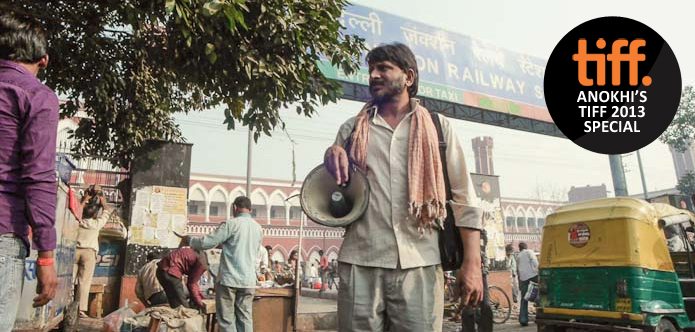Director: Richie Mehta
Cast: Rajesh Tailang & Tannishtha Chatterjee
Produced by: Steven N. Bray & David Miller
Rating: 3.5/5
What would you do if your child disappeared? It’s a question most parents shudder to think about; it taps into a primal fear coded into our DNA. Indeed, for many, losing a child would be worse than death.
Siddharth is not the only film at this year’s festival at TIFF 2013 to explore this concept; Denis Villeneuve’s Prisoners has been earning raves as a taut, edge-of-your-seat thriller centred on the ordeal of two middle-class American couples as they, along with a tenacious cop, search for their missing daughters.
On the surface, they sound similar, and indeed, the pain, desperation and panic of a parent is the driving force in both. But Canadian helmer Richie Mehta’s film isn’t interested in whodunit, instead using the abduction at its core to tell a touching, bittersweet tale of a father’s devotion in the face of insurmountable odds.
Mahendra Saini (Rajesh Tailang) is a chain-wallah, fixing zippers on the street corners of Delhi. It’s not a terribly lucrative trade, and certainly not enough to adequately support wife Suman (Tannishtha Chatterjee) and two young children. So he sends his son, 12-year-old Siddharth, to earn some extra money working in a trolley factory out of province. But a month later, when Siddharth is supposed to come home, the boy is nowhere to be found. They reach out to authorities and children’s welfare organizations but neither can do much more than take down the boy’s name and send the parents on their way.
And so they’re left on their own, to do everything in their power to put the family back together. But their power is almost non-existent. They don’t even have a picture of Siddharth because they can’t afford a camera. When Mahendra learns of a place called Dongri, where kidnapped children are commonly brought, he has no way of finding out where it is other than to casually ask his customers, at the end of every zipper repair, if they’ve heard tell of it.

Rajesh Tailang in the movie Siddharth /tiff.net
The only reason he does find it is because one day he happens to be working on a woman with a smartphone, who off-handedly Googles it, finding out in five seconds what he’d spent days, maybe weeks, searching for.
The obstacles, from the outset, seem like too much to handle. And that sense of futility doesn’t subside, even when a lead pops up. If anything, it builds. Indeed, Siddharth is far from the taut, propulsive affair you expect when walking into a film centred around a kidnapping. Mehta’s pace is deliberate, his tone melancholic.
For the majority of the film, the effort to find the boy involves Mahendra going through the motions of his job, gradually sniffing out info and earning enough money for a train ticket to Dongri.
Tailang and Chatterjee both turn in remarkably nuanced performances, internalizing nearly all of the guilt, confusion, and desperation as their characters put their heads down and soldier through an unbearable situation. And Mehta’s script does well, in particular, to peel back Mahendra’s layers gradually, revealing a complex, thoughtful, quietly devoted man via several unexpectedly poignant encounters on the streets of Delhi.
His rendering of India, meanwhile, is just as intriguing. It’s become cliché to say that a film’s setting is a character. But it seems appropriate here since the country isn’t just a palpable presence, it’s the antagonist. Though there’s some speculation that Siddharth may have been taken for human trafficking or organ theft, you never feel the presence of a “bad guy.” It’s the country, the city that took him, as it’s taken countless other children. Mehta doesn’t paint it as menacing, exactly; just impossibly big and indifferent.
The size of his opponent really starts to register toward the end of the film when Mahendra, having at last scraped together enough money for a ticket to Dongri, begins searching halfway houses filled with runaways and young offenders. Here, as his protagonist examines the assembled boys, Mehta pushes in close, cutting from one lost young face to the next. Siddharth’s not there. But, “come back next week,” says the administrator, “I’ll have 9 or ten more.”
It’ll take a massive stroke of luck for father and son to be reunited. Whether or not that stroke ultimately comes for this particular father and son isn’t really the point. In one sense, this film is about drawing attention to what’s accurately been referred to as an “epidemic” of lost youth. But its appeal, its beauty lies in how it answers that first question.
What you do when your child goes missing? Absolutely everything you can, even when there’s nothing to be done.
Feature Image & Video courtesy of Poor Man's Productions
Matthew Currie
Author
A long-standing entertainment journalist, Currie is a graduate of the Professional Writing program at Toronto’s York University. He has spent the past number of years working as a freelancer for ANOKHI and for diverse publications such as Sharp, TV Week, CAA’s Westworld and BC Business. Currie ...














































































































